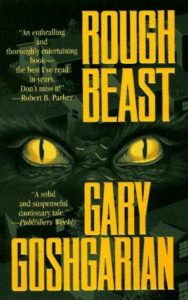 By GARY GOSHGARIAN (Leisure; 1995/97)
By GARY GOSHGARIAN (Leisure; 1995/97)
Here’s an ambitious horror novel that appeared in the mid-1990s, after the horror boom of the 1970s and 80s had been officially put to rest. That explains why ROUGH BEAST isn’t particularly well known–well, that and the fact that it isn’t a very good book.
It’s certainly readable, with a well-structured, cinematically-informed narrative, even if that narrative is obnoxiously familiar in most respects. It’s yet another treatment of the horrors of puberty, and hits all the expected notes: a teenager begins acting strange, exhibiting heightened aggression and odd physical symptoms, such as an unnaturally thick mane of body hair and (as the author makes a point of continually reminding us) adult-sized genitals. His parents are flummoxed and doctors continually misdiagnose his condition—which, as the reader immediately senses, is far from natural.
No, the kid isn’t demonically possessed, and nor is he a werewolf. The problems, in fact, are caused by an experimental toxin that years earlier was dumped on the property upon which the afflicted kid now lives. This allows for a subplot involving a hitman who enjoys his job a bit too much; this freak is charged with knocking off everyone involved in the creation of the toxin, but makes a spectacular mess of the job (as the killings are supposed to look like accidents but don’t).
Inevitably the afflicted boy and the hitman meet up, with violent results. Unfortunately things go downhill in this portion of the book, which increasingly falls victim to Hollywood clichés. Such clichés are present earlier on in the text, but they’re tolerable (in part because the reader is hoping things will improve). That’s not the case with the final pages, which insist on including hoary Hollyweird standbys like the pivotal character who appears to get killed (complete with a lot of mourning by said character’s loved ones) but isn’t actually dead, and the bad guy who has the hero in his (gun)sights but does himself in by talking too much. The last page even contains what, if this were a movie, could be taken as a direct set-up for a sequel.
It would seem that the author was aiming for a Hollywood sale. Whether he ever succeeded in that aim I don’t know—I actually hope he did, as this book frankly doesn’t have much worth otherwise.
